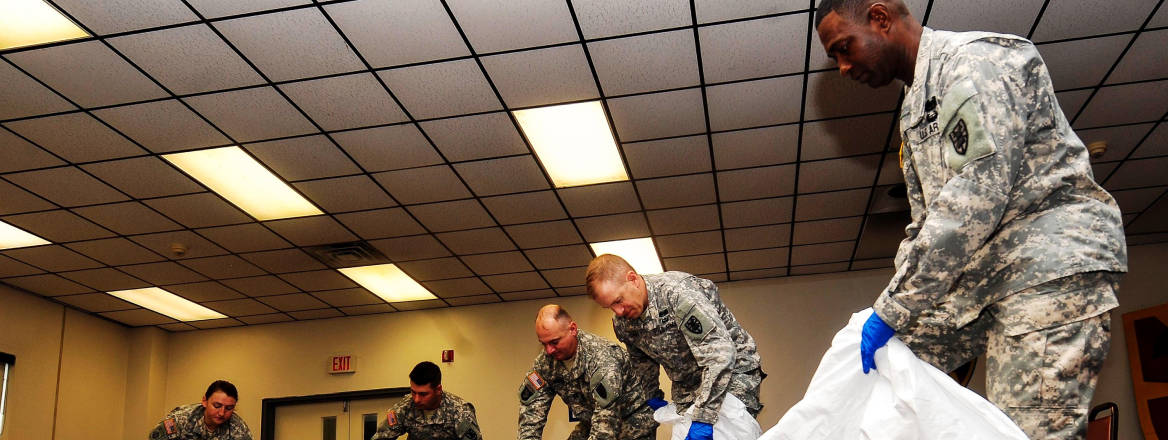Defence Sector Corruption, an Underestimated Foe in Times of Crisis
As states look to militaries to help combat the coronavirus outbreak, they risk empowering forces weakened by corruption and poor governance.
Throughout the coronavirus outbreak, all eyes have been on the sector providing the frontline response to the epidemic: healthcare. But as the military steps in to assist in a growing number of countries around the world, there are questions about whether that could lead to additional problems.
The military capacity for rapid, large-scale movements – whether to protect hospitals, distribute supplies or increase transport capabilities – can be essential in responding to an infectious disease outbreak. Large-scale military deployments are likely to have the biggest impact in countries with weak healthcare systems and governance, limited civilian response capacities, vastly dispersed populations, or ongoing conflict and insecurity.
As low-income countries brace for the onset of the coronavirus pandemic and health authorities warn of challenges ahead, it is important to remember that large-scale military operations in support of the response to coronavirus in fragile and conflict states carry significant risks. Political, financial and health crises often expose cracks in the system that are less noticeable in more settled times. For instance, long-term governance gaps and ongoing corruption in armed forces can undermine civilian trust, making their work during crises more difficult. Military deployments during the Ebola outbreaks in the DRC and Liberia in 2014 and 2019 are examples of the role armed forces can play in limiting the scale of an epidemic – yet groups such as Médecins Sans Frontières also argued that years of abuse at the hands of the DRC’s military had made the local population wary of these troops, undermining their efforts.
Transparency International’s Defence and Security research shows that in many developing and fragile states, defence sectors tend to be poorly governed. High levels of secrecy and dysfunctional oversight structures often enable fraud, corruption and a wide range of abuses. The coronavirus crisis, like others before, has the potential to exacerbate these vulnerabilities, weakening militaries when they are needed most.
For example, where frontline soldiers go unpaid or have their salaries stolen by senior officers – a problem which research indicates affects the DRC, Iraq, Mali and Nigeria – militaries could see ill-disciplined units prone to avoiding service, busy trying to secure other sources of income or abusing civilians. A health and humanitarian emergency, which puts frontline responders at additional risk, could prove too much for those troops to handle, while sudden access to scarce resources could provide opportunities at the expense of the civilian population. Where militaries are already affected by corrupt practices, acceptance of small bribes and other favours can undermine containment efforts. Simultaneously, favouritism or corrupt networks could skew distribution of healthcare equipment by influencing the choice of priorities. Disciplinary issues, usually more widespread in states with weaker overall defence governance, could make an appearance or be exacerbated by the crisis. In the Philippines, for instance, President Duterte has already given police and military officials the order to shoot ‘troublemakers’.
Finally, a health and humanitarian crisis could see deployments of foreign troops into fragile and conflict states. As the Ebola example suggests, sizable deployments of US and UK forces into Liberia and the DRC helped construct and protect health facilities, distribute supplies and train healthcare workers. However, as international forces intervene in crises, the tangible and intangible resources they bring – such as cash, necessary items and political support for local actors – could further strengthen corrupt networks, as has been seen in countries such as Afghanistan. As Transparency International’s guidance on military interventions indicates, international forces themselves are also not immune to corruption, exacerbating challenges already in existence.
As economies weakened by coronavirus will require additional investment to rebuild, countries cannot allow uncontrolled resource outflows through defence and security institutions. Governments should take measures to strengthen defence governance immediately, offering a maximum level of protection in the short term and strengthening the global response. The authors recommend, for instance:
- Inserting anti-corruption measures and the highest levels of transparency at the core of any new legislation (including that governing the distribution of resources) to respond to the emergency. This should include making publicly accessible contracts that govern financial flows and procurement associated with the crisis.
- Ensuring that military deployments to help manage the emergency have clear timelines, independent oversight and are subject to review and audit mechanisms.
- Extending protection to whistleblowers to help ensure that those who see corruption, whether in healthcare or in defence, can safely report it.
In the longer term and as the crisis recedes, it is key that attention to oversight and control of the defence sector becomes a priority, especially in fragile and conflict-affected states. Defence, healthcare and development are not mutually exclusive; slippage in one is likely to endanger progress in the other. Without fixing defence, sustainable development and better healthcare are unlikely to take root, especially in the most vulnerable countries.
Ara Marcen Naval is the Head of Research for the Defence Sector at Transparency International
Karolina MacLachlan is Transparency International’s Regional Programme Manager – Europe.
The views expressed in this Commentary are the authors', and do not represent those of RUSI or any other institution.

